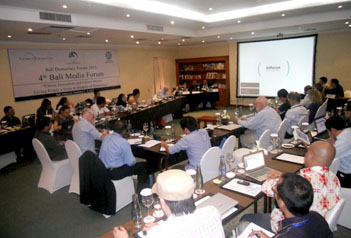4th Bali Media Forum
Ethical Journalism and Citizen Media: Giving People a Voice in Support of Democracy
November 7-9th 2012
Final Statement
We the representatives of editors, journalists’ groups, press councils and media support bodies from 17 countries participants of the 4th Bali Media Forum workshop “Ethical Journalism and Citizen Media: Giving People a Voice in Support of Democracy” organised by the Thomson Foundation, the Indonesian Press Council and the Institute for Peace and Democracy and in partnership with the Ethical Journalism Network, meeting in Bali on November 7-9 2012, agree the following conclusions:
Welcoming the recent advances for media and democracy in the Middle East and Asia which give new momentum to the creation of an inclusive global culture of media freedom
Believing that media freedom flows from constitutional and legal protections for free expression as well as commitment from media professionals to the highest standards of ethics, good governance and self-regulation,
Reiterating that all forms of self-regulation must be independent, particularly of undue political influence,
Noting that pluralism and the public interest are strengthened by the creation of open information systems including social media and online communications which enrich the capacity for democratic exchange,
Reiterating the conclusions of earlier meetings of the Forum
That creating an environment to ensure free media and independent journalism, without any form of legal or political pressure, must be a priority for all governments committed to democracy,
That government should support the creation of transparent, professional and independent forms of media accountability to:
• advocate and campaign for press freedom and good governance in media,
• contribute to education within society on the role of free media in democracy,
• mediate problems that arise between media and their audience,
• promote access to public information and to information technology that will ensure the full participation of citizens in democratic society.
Agree the following final statement:
A new programme of action to support independent media and journalists in the Asia-Pacific is urgently needed to help create credible systems and structures in support of ethical standards, good governance and independent self-regulation.
The key strategic approach to promoting media ethics should be to focus on the three groups involved: journalists, media owners and independent self-regulatory structures.
Future work should focus on both internal structures for ethics and governance involving owners and editors as well as external forms of independent national self-regulation.
In this respect the Forum welcomed the Asool initiative of GEO TV (http://www.geo.tv/asool/Geo_Manifesto.asp) in Pakistan, which aims to establish a social contract between Geo TV and its audience. The Forum supports using existing positive initiatives undertaken by media managers as a way to get other media houses to join efforts in support of ethical journalism.
Building on the network of independent press councils launched by the 2nd Bali Media Forum, the meeting agrees to launch as a priority an Alliance of Press Councils for the Asia Pacific region, which will establish a common standard for independent regulation of journalism across all media platforms.
The Alliance will support on-going media reform processes and creation of interim media councils in Myanmar and Timor Leste as well as promoting discussion in countries where no viable form of media self-regulation exists.
The Forum further agrees that the organisers should:
- Prepare a regional report on the state of ethics, governance and self-regulation in the Asia-Pacific region and to undertake a pilot research project on the state of affairs of self-regulation around the world, examples of online news standards, examples of best practice relationship between traditional self-regulation and on-line media, case studies on initiatives promoting journalists’ ethics and internal governance undertaken by media houses themselves.
- Carry out training on ethical principles for journalists and specifically to develop training for media owners and editorial managements on the need for transparency and rules of good internal governance.
- Work with other groups supporting independent self-regulation and media ethics in other regions to develop a unified and global approach to the promotion of ethics, good governance and self-regulation.
Debating the challenges to self-regulation with the increasing importance of on-line and social media, the Forum agreed that professional journalists and on-line media posting on the internet or twitter should apply the same ethical standards as journalists in established off-line media.
But other questions remain: What standards should be applied to bloggers, who are not journalists? How can we ensure that journalists using on-line and social media as sources for reporting apply high standards of ethics and verifying information?
In addressing these challenges the Forum agrees that there should be more practical ethics training for journalists, bloggers and media managers of both off-line and online media.
In recognition of the Bali Media Forum’s 5th birthday next year we urge the organisers to expand the number of participating countries as well as inviting more journalists, editors, media owners, independent media councils and media support groups in support of ethical journalism.
Finally, the participants agreed that these conclusion should be noted by the Bali Democracy Forum V.*

